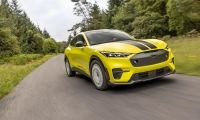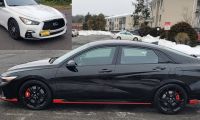Upon closer examination, Zehner’s agenda in this scathing indictment seems to be based on the misguided concept that for many of us bicycles could take the place of cars in our lives. He might be partially right if we all lived in California, Texas or Florida and lived within five miles of our work.
Of course we’d all need bicycle trailers to haul anything at all, but how this well-intentioned if big-picture challenged pundit thinks he’s going to get overweight people who won’t even use their seatbelts to switch to riding bicycles is a million dollar question. It might be good for their health – except for all the CO2 and particulates in the air.
What he’s suggesting comes in part from the way academia works. The university is meant to provide an ivory tower from which academicians can look down upon society and perceive patterns invisible to the rest of us down at street level.
Obviously Zehner has been up in the tower far too long and needs to spend some time in the streets he purports to know something about.
"Shifting from gasoline to electric vehicles is like switching a smoking habit from cloves to menthols," asserts Zehner. "It isn't acceptable for doctors to promote menthol cigarettes -- should environmentally minded people promote alternative fuel cars?"
Case in point – anyone who has ever smoked knows the person smoking clove cigarettes is attempting to break the habit (or just thinks its cool) and is not about to switch to menthol cigarettes.
Furthermore, having known someone who flew head over heels off a scooter when they encountered a pothole (with highly injurious results), Zehner is doing exactly what he’s accusing the doctor of – by suggesting we all ride bikes. The cars of today are much safer than riding a bicycle.
On a radio station in the seemingly foreign land of California yesterday, Zehner asserts the higher cost of electric cars reflects the greater quantities of fossil fuels used to build them, apparently unaware it is the battery that raises the price of EVs and hybrids.
He makes the argument that electric cars do not eliminate the negative side effects of vehicular travel, but merely shift the problems elsewhere and we know what he’s saying. One hundred years ago our cities were polluted with horse droppings and the cost of transportation was about sheltering and feeding the beasts.
Automobiles removed the smelly piles of partially digested hay from our streets and replaced it with the smell of partially combusted hydrocarbons. Fortunately, the automobile works in a wider array of weather and keeps you more comfortable, whatever the weather is doing. Even long drives today won’t give you saddle sores.
However, the same principle of unintended consequences would still apply if we all switched to bicycles tomorrow. We would simply trade our current problems for new ones.
He correctly points out EV studies compare traditional gasoline fuel to electric car charging, which relies primarily on coal, natural gas and nuclear power – overlooking the fact we can use of wind, sun and water to produce electricity.
Zehner goes on to point out the impact of manufacturing the car, also oblivious to the extent many auto manufacturers have gone to in reducing the carbon footprint of the manufacturing process in recent years. The UC at Berkeley probably produces as much or more CO2 as the nearby Tesla Plant.
He whines about how the added copper, aluminum, rare earth metals and other materials used to create EVs offset any benefit of the car’s electric lifetime.
Has anyone studied how much copper, aluminum, rare earth metals and other materials are used to fight Oil Wars and keep fossil fuels cheaply available? What is the carbon footprint of an IED, RPG or SmartBomb?
Are automotive manufacturers responsible for what mining entails?
In any case, won’t these metals be mined for one use or another until every single resource is extracted from the Earth?
Wouldn’t the same results follow building newer and better bicycles for every person – as you can’t carry a family on your bicycle?
"Alternative-fuel vehicles stand to define and spread patterns of 'sustainable living' that cannot be easily sustained without cars,” Zehner added. “Suburban infrastructure maintenance and road construction induce ecological consequences beyond the side effects of the vehicle itself."
Of course they do, but what’s the point? It’s like saying we all produce carbon dioxide when we exhale, so if you must breathe, don’t overdo it. Here’s a newsflash – cars don’t cause urban sprawl, population growth does.
Frankly we think it’s easier to get the firearms out of the hands of an NRA member, than it is to get Americans out of their cars.
We agree with Zehner that city planning and maybe even two-wheel transportation both have a part to play in solving our problems, but to rule out the contribution EVs can make, along with other alternative fuels and technologies, is simply not seeing the big picture.
It comes down to this: a system based on perpetual growth on a planet of finite resources is bound to hit a wall sooner or later. Sustainability is about putting that off until mining the remaining resources of the solar system at large is practical.
We certainly won’t get there on bicycles. Just ask Elon Musk.
Set as google preferred source











Comments
In the meantime, he's getting
Permalink
In the meantime, he's getting much attention with little to show for. People like that abound and have a hard time seeing the bigger picture.
This is the most hilarious
Permalink
This is the most hilarious article I've ever read. Don Bain must be seriously mentally challenged.
1. Are automotive manufacturers responsible for what mining entails?
Answer: Yes. To the extent that they use a great deal of the materials to manufacture cars, yes. Obviously. And we as consumers of those cars are also responsible.
2. Has anyone studied how much copper, aluminum, rare earth metals and other materials are used to fight Oil Wars and keep fossil fuels cheaply available? What is the carbon footprint of an IED, RPG or SmartBomb?
Answer: This proves the point of the author Bain is criticizing. These wars are fought, in part, to keep oil and other materials inexpensive in order to feed our consumption habits.
3. Wouldn’t the same results follow building newer and better bicycles for every person – as you can’t carry a family on your bicycle?
Answer: this is especially hilarious. First of all, look around you when you drive next time and count how many cars have more than one person in them. Not too many especially during rush hour during the week. Second, even if we gave each person a bicycle, the amount of energy and materials needed to construct one bike/person would pale in comparison to the amount used to manufacture cars, which require many times the amount of energy. You could probably manufacture dozens of bikes for the same amount of energy/materials as one car.
4. Here’s a newsflash – cars don’t cause urban sprawl, population growth does.
Wrong: Surburban sprawl occurs even in the absence of population growth. They often go hand in hand, but there are certainly many countries that don't have near the level of suburban sprawl as the U.S. despite population growth and that's because they put more resources into building public transit infrastructure. And there are places with low population growth that have sprawl because of increased demand for cars.
5. Zehner asserts the higher cost of electric cars reflects the greater quantities of fossil fuels used to build them, apparently unaware it is the battery that raises the price of EVs and hybrids.
Hilarious again! Does Bain think the batteries grow on trees? They require FOSSIL FUELS to manufacture both for the manufacturing process and for the extraction of the minerals/materials needed to build them.
Seriously, it's like this dude did not even finish 6th grade. And he obviously didn't read the book or he'd know that Zehner's solution for many of the problems cited above don't begin and end with the bicycle. Try reading the book before bashing it.
I'm gonna throw out a wild
Permalink
In reply to This is the most hilarious by Anonymous (not verified)
I'm gonna throw out a wild guess that "Anonymous" here is Zehner's publisher..
Nope. Wrong again. I read the
Permalink
In reply to I'm gonna throw out a wild by Aaron Turpen
Nope. Wrong again. I read the book, apparently something Bain did not do.
Only my first time being
Permalink
In reply to Nope. Wrong again. I read the by Anonymous345 (not verified)
Only my first time being wrong, so it's not "again." :)
You're right - sorry.
Permalink
In reply to Only my first time being by Aaron Turpen
You're right - sorry. Apologies.
Ozzie is apparently trying to
Permalink
Ozzie is apparently trying to keep us in the dark ages. He does make a good point about possible green house gases from manufacturing solar panels, but he is so anti-green he is clearly biased against any new technology, whether it be wind, hydro, solar. Does he endorse any green technology? I haven't read the book and never will buy it. I might read it if it goes on bittorrent though.
Actually, he states in the
Permalink
In reply to Ozzie is apparently trying to by danwat1234 (not verified)
Actually, he states in the book that he is not against the use of technology. He is, however, concerned that the U.S. does not have the appropriate context for those technologies to do much good at this point. In other words, we're throwing the technology and the energy down the drain because all the production of more energy does is lower the cost of energy and increase demand. "Green" technologies, rather than outsetting fossil fuel use simply spur more use. But there are things we can do to change the context so that some of those technologies start working for us rather than against us. I encourage you to read the book. Ask your library if they have it if you don't want to buy it, or yeah, bit-torrent it. Zehner sounds like he wouldn't give a sh** - the book is nonprofit anyway.
LOL, last I checked, we
Permalink
In reply to Ozzie is apparently trying to by danwat1234 (not verified)
LOL, last I checked, we created CO2 by simply breathing. Maybe he will do his duty and stop breathing for a while in order to compensate for his odd views?
This is the same meaningless
Permalink
In reply to LOL, last I checked, we by Nicolas Zart
This is the same meaningless point that Bain makes in his article. The problem is not CO2 per se - it's the increasing concentrations of CO2 in the atmosphere and this is largely due to increasing rate at which fossil fuels are burned. To compare the levels of CO2 from breathing to that from burning fossil fuels is obviously absurd.
It's really striking to me how willing people on this site are to simply criticize the book when it's clear that they haven't even read it. For example, Zehner actually criticizes the environmental movement for focusing SOLELY on CO2 when there are other greenhouse gases that are more toxic and damaging and will increasingly become a problem the more we switch to alternative energy technologies. They may not be a huge problem now, but as we ramp them up, they will start to become so.
His arguments are actually quite nuanced and well thought out and I think you'd find his style not at all "odd" or even accusatory.
Ozzie is obviously a big
Permalink
Ozzie is obviously a big Yahoo Green fan. Those people hate everything that's not human-powered and 100% recycled. :)
Good thing he doesn't spell his name with a Y. That would be an affront to all things unholy.
Terrible journalism. Why
Permalink
Terrible journalism. Why don't you stick to the story instead of criticizing right away?
Note that this is "News
Permalink
In reply to Terrible journalism. Why by Anonymous (not verified)
Note that this is "News Opinion" so it's not "journalism" it's editorial.